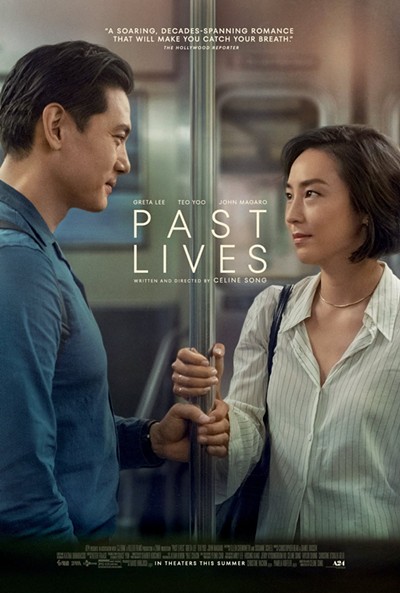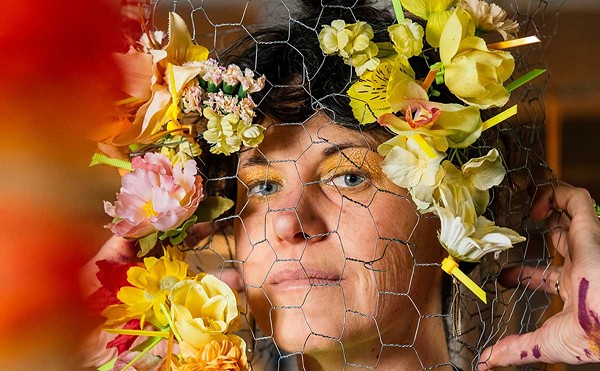Writer-director Celine Song’s melancholic romantic drama Past Lives opens with a heck of a shot. The camera slowly zooms in on an Asian woman and two men — one Asian, one white — chatting at a bar. Their conversation is muffled by ambient sound, but a pair of offscreen observers can be heard, attempting to untangle the relationship dynamic of this trio from across the room, based solely on their body language. Husband and wife plus brother? Girlfriend and boyfriend plus co-worker? Race and gender play an implicit role in the unseen voyeurs’ suppositions, but the truth of the matter is both simpler and more poignant than they suspect. Eventually Song will return to this moment, giving the viewer the proverbial reverse shot from the trio’s perspective, with the addition of 24 years of heart-wrenching context.
The story proper begins in Seoul, South Korea, in the late 1990s, as the friendship between elementary school students Na Young (Seung Ah Moon) and Hae Sung (Seung Min Yim) is just starting to develop into a mutual crush. Unfortunately, Na Young’s parents have recently decided to relocate their family to Canada, though not before Na Young and Hae Sung have their first and only chaperoned playground “date.”
Twelve years later, the twenty-something Na Young (now going by Nora, and played by Greta Lee) is an aspiring playwright in New York City when she hears through the family grapevine that Hae Sung (Teo Yoo) has been looking for her on social media. They eventually reconnect via a video call, and she learns that he’s still living in Seoul and studying for an engineering degree following his compulsory military service. Nora’s Korean might be a little rusty, but they’re both visibly beaming at this digital reunion.
For a time, the pair maintain a regular correspondence of texts, emails, and video calls, the 13-hour time zone difference between the be damned. However, the initial elation of their reignited crush soon cools, their nascent careers take priority, and Nora pulls the plug on their long-distance maybe-relationship. Fast-forward another 12 years: Nora is now married to novelist Arthur (First Cow’s John Magaro) and living in Brooklyn, where they are both eking out modest artistic success.
Then Hae Sung abruptly breaks over a decade of silence: He’s going to be in New York for a couple of nights. Would Nora want to meet up? Arthur is understandably anxious at the reappearance of this childhood sweetheart, but Nora’s interests in reuniting with Hae Sung are more contemplative than romantic (mostly). In Hae Sung, she sees a window to the life that she left behind and the little girl she once was. A different kind of feature would use this meeting between old friends as a catalyst for a relationship crisis, but Past Lives’ gentle, introspective mood makes it clear that the story is not headed for melodramatic upheaval.
Indeed, Song achieves something remarkable with her feature debut, a deeply romantic film that isn’t really about romance per se. As the title suggests, Past Lives is concerned with regret, longing, and the relentless, unpredictable churn of life. Song and her performers do a fantastic job of maintaining a tricky balance, as the chemistry between Nora and Hae Sung needs to feel potent and authentic but not calamitously destabilizing. Nora and Hae Sung’s adult interactions — first over video calls, then in person — are full of nervous giggles and long, meaningful pauses. These are two people with a deep connection, but what that connection means after nearly a quarter-century apart is compellingly uncertain.
Like Nora, Song is a Korean-Canadian playwright living in the U.S., and Past Lives reportedly has a semi-autobiographical dimension. It’s the sort of screenplay that can only come from lived experience and keen observation. Her writing and direction are unfussy yet astute, gracefully conveying the complex psychology of relationships, immigration, and the process of growing into one’s settled adulthood. Despite the Seoul and New York settings, there’s also something distinctly Canadian about the film. Maybe it’s the soft natural lighting, the general pensive vibes, or the indie folk-rock score by Grizzly Bear members Christopher Bear and Daniel Rossen.
All three of the central performances are strong, but Lee is a revelation in the lead role. Best known for supporting parts on The Morning Show and Russian Doll, she provides phenomenal shading to a strong-willed but sensitive woman who is grappling with the person she’s become. The Korean Buddhist concept of inyeon — an interpersonal connection that spans multiple lifetimes — is central to the film’s thematic heart, but for poetic rather than literal reasons. Nora deflates the mystique of the idea by conceding that Koreans use it as a pickup line, and Song is less interested in ethereal notions of destiny than in conveying aching, universal emotions. Despite (or because of) the specificity of Nora’s story, even the most cold-hearted viewer will likely leave Past Lives in a reflective mood, ruminating on their own lost loves, fateful choices, and roads not taken.
Film Details
Subscribe to Metro Times newsletters.
Follow us: Google News | NewsBreak | Reddit | Instagram | Facebook | Twitter








